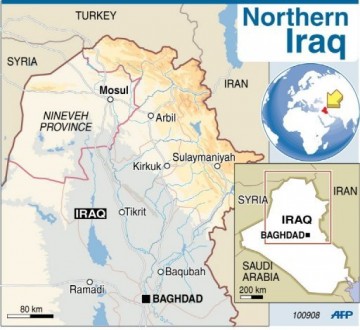Editor’s Note – No matter how things turn out in Syria, we can trust in one basic aspect of its future, fanatical Islamists see an opportunity, a void, and will likely fill it and gain control. They have one goal, world dominance, and even their own fellow Muslims are seen as being in the way.
Hosni Mubarak kept the lid on them in Egypt, now the Salafists are taking over. Saddam Hussein kept a lid on them in old Iraq, and since our forces have left, the attacks increased almost immediately and Iraq is now a puppet of Tehran. Regional hegemony goals favor Iran.
Be careful what you ask for, you may get it. Its a very complicated dance between the power hungry, the manipulation of the masses, international finagling, and mixing in the ideology of Islam, fanatics will succeed every time. The big winner will be Russia, no matter who comes out on top, and Iran will be standing along side them.
Jihadists, weapons ‘moving from Iraq to Syria’
By Ammar Karim and Sammy Ketz (AFP)
BAGHDAD — Jihadists are moving from Iraq to Syria and arms are also sent across the border to opponents of Syrian President Bashar al-Assad’s regime, Iraq’s deputy interior minister said in an interview with AFP on Saturday.
Adnan al-Assadi also called private security firms “a danger to security,” and said that Iraq wants to reduce their number — which currently stands at 109 companies — and will not issue additional licences for them.
“We have intelligence information that a number of Iraqi jihadists went to Syria,” Assadi said, adding that “weapons smuggling is still ongoing” from Iraq into Syria.
Since March last year, Assad’s regime has carried out a bloody crackdown on an uprising in which more than 6,000 people have been killed.
While there are still regular civilian protests that turn deadly in Syria, the focus has now also shifted to armed conflict with regime forces.
“The weapons are transported from Baghdad to Nineveh (province), and the prices of weapons in Mosul (the province’s capital) are higher now because they are being sent to the opposition in Syria,” Assadi said.
He said that the price of a Kalashnikov assault rifle has risen from between $100 and $200 to between $1,000 and $1,500.
“The weapons are being smuggled from Mosul through the Rabia crossing to Syria, as members of the same families live on both sides of the border,” he said.
And “there is some smuggling through a crossing near Abu Kamal,” Assadi said, referring to a Syrian city.
There are large numbers of weapons in Iraq after three decades marked by multiple wars and a violent insurgency following the 2003 overthrow of now-executed dictator Saddam Hussein.
Assadi said some Arab jihadists have returned to their home countries to take part in revolutions there.
“In the past, Syrians were fighting in Iraq, and now they are fighting in Syria, and also the Egyptians are fighting in Egypt, the Yemenis in Yemen, and the Libyans in Libya.”
“Violence in Iraq is less now because Al-Qaeda has so many places to fight,” Assadi said.
Egypt’s former president Hosni Mubarak “used to send jihadists to Iraq and financed them to fight in Iraq, and (ousted Libyan leader Moamer) Kadhafi used to have many organisations fighting in Iraq,” he said.
Assadi also discussed the issue of private security companies in Iraq.
Iraq deeply mistrusts such companies, and their employees have faced bureaucratic delays and detentions in recent months.
“When it comes to foreign security companies, we are between two fires — investment and development, and security,” Assadi said.
“The foreign companies do not trust our security forces, and the embassies also do not trust our police. That is why they prefer contracts with foreign (security) companies.”
“These security companies are a danger to security in the whole world,” Assadi said. “We are working to decrease the number of the security companies, and we are not issuing new licenses.”
He added that parliament should pass a new law on private security companies, including a provision increasing the guarantee they must pay the interior ministry to work in Iraq from $25,000 to $250,000.
Assadi said that of the currently 109 private security firms in Iraq, 36 are foreign. Overall they employ 36,000 people — 18,500 foreigners and 17,500 Iraqis.
He also referred to the case of Sunni Vice President Tareq al-Hashemi, who has been charged with running a death squad and has been hiding out in the autonomous Kurdistan region in the north since mid-December.
Assadi said that 60 people, “including members of (Hashemi’s) bodyguard and two generals from the interior ministry,” have been arrested in connection with the case.
Another 16 wanted people are with him in Kurdistan, he said.
The Hashemi case centres on his bodyguards, who are accused of training for and carrying out assassinations.
Assadi said the defence ministry is currently responsible for the 250 bodyguards each protecting the prime minister, speaker of parliament and president of Iraq, and between 60 and 100 who guard their deputies.
The interior ministry is responsible for screening the 30 bodyguards who protect each minister and those who guard MPs.
The interior ministry employs 650,000 people, he said.


